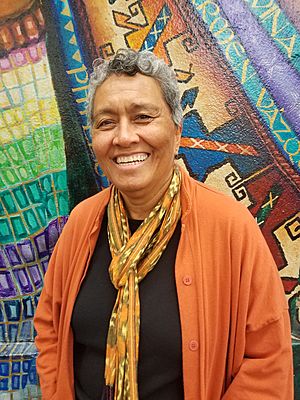Margo Okazawa-Rey facts for kids
Quick facts for kids
Margo Okazawa-Rey
|
|
|---|---|
 |
|
| Born | November 26, 1949 |
| Scientific career | |
| Institutions |
|
Margo Okazawa-Rey, born on November 26, 1949, in Japan, is an American professor, teacher, writer, and activist for social justice. She is well-known for helping start the Combahee River Collective. She is also known for her work supporting women's rights and safety across different countries.
Through her studies and activism, she looks at how military actions and the global economy are connected. She also explores challenges faced by communities of color in the United States and around the world. Her work aims to improve the safety and well-being of women everywhere.
Contents
Early Life and Education
Okazawa-Rey was born in Kobe, Japan. Her father was African-American and her mother was Japanese. She has shared that her mixed heritage, which came about during the American presence in Japan, influenced her work against military actions. When she was ten years old, she moved to the United States.
She earned her first college degree, a Bachelor of Arts (B.A.), in Sociology from Capital University in 1973. The next year, in 1974, she received a Master of Social Science (M.S.S.) from Boston University School of Social Work. Later, in 1987, she completed her Doctor of Education (Ed.D.) from Harvard Graduate School of Education.
Career and Work
Teaching and Social Work Roles
Margo Okazawa-Rey is now a professor emerita at San Francisco State University, meaning she is a retired professor who keeps her title. She also taught in the doctoral program at the Fielding Graduate University in Santa Barbara, California.
From 1974 to 1982, Okazawa-Rey worked as a social worker in Massachusetts. During this time, she also helped create CARE (Campaign for Anti-Racist Education).
From 1979 to 2003, she held many teaching jobs. These included positions at New Hampshire College, Simmons College, and the University of Maryland, Baltimore. She also became a professor and undergraduate program coordinator at San Francisco State University.
Okazawa-Rey held special teaching positions at Hamilton College. She was the Jane Watson Irwin Chair from 1999 to 2001. She returned later, from 2014 to 2016, as the Elihu Root Chair in Women's Studies.
From 2002 to 2005, Okazawa-Rey directed the Women's Leadership Institute at Mills College. She also taught social policy and U.S. Women of Color as a visiting professor. While at Mills College, she suggested creating a special teaching position named after former congresswoman and college alumni Barbara Lee. Okazawa-Rey later held this Barbara Lee Distinguished Chair in Women's Leadership from 2010 to 2011, and again from 2018 to 2019.
Research and Activism
As a founding member of the Combahee River Collective in the mid-1970s, Margo Okazawa-Rey's work was greatly shaped by this group. Their ideas, especially about how different parts of a person's identity (like race and gender) connect, influenced her activism. She focused on issues like military violence against women and conflicts between different ethnic groups.
She also helped organize "Women Redefining Security" conferences in places like Okinawa, Washington, D.C., and Seoul, Korea. Her main interests include military actions, armed conflicts, and violence against women. She has studied how military presence and the global economy affect women in places like South Korea, especially those living near U.S. military bases.
In 1978, Okazawa-Rey helped write "A Black Feminist Statement" with the Combahee River Collective.
In 1994, she received a Fulbright Program grant to study in South Korea. She was interested in understanding how different minority groups, like Korean and African Americans, viewed each other. This was especially important after events like the 1992 Los Angeles riots. During her time in South Korea, she noticed the U.S. military presence and the lasting effects of the Japanese colonization of Korea. She saw a connection between the U.S. military and how race and gender relations played out both abroad and at home.
In 1997, she was one of 40 women who helped start the East-Asia-U.S. Vieques Women's Network Against U.S. Militarism. This group later became the International Women's Network Against Militarism.
She has a long history of working for social justice around the world. She serves on the international boards of organizations like PeaceWomen Across the Globe (in Switzerland) and Du Re Bang (My Sister's Place, in South Korea). She also worked as a research consultant at the Women's Centre for Legal Aid and Counselling in Palestine.
Okazawa-Rey also worked with other women, including Amina Mama and Rose Mensah-Kutin, to study areas affected by conflict in Sierra Leone, Liberia, Ghana, and Nigeria. They looked at how feminist research can help activism, change policies, and empower women. She also explored how military and prison systems affect young people from working-class communities of color in America. She connects ideas about foreign policy with domestic policy.
She has shared her knowledge at places like Yale University and with students and alumni from Brown University.
Personal Life
In 2020, Margo Okazawa-Rey was one of more than 100 Black scholars and academics who publicly supported Bernie Sanders during the Democratic Party presidential primary elections.
Awards and Recognitions
- Fulbright Senior Research Fellowship in 1994.
- Social Science Research Council Grant in 1996.
- Jane Watson Irwin Distinguished Chair in Women's Studies at Hamilton College, from 1999 to 2001.
- Feminist Activist Scholar in Residence at Scripps College in 2006.
- Distinguished Fellow in Research Justice at Mills College from 2013-2014.
- Barbara Lee Distinguished Chair in Women's Leadership at Mills College from 2008-2009 and 2018-2019.
- Received Lasting Legacy Award at the Words of Fire Conference held April 29th and 30th at Spelman College in 2017.
 | Mary Eliza Mahoney |
 | Susie King Taylor |
 | Ida Gray |
 | Eliza Ann Grier |

